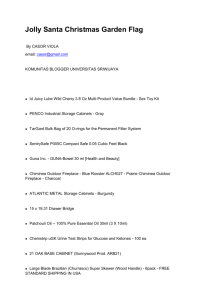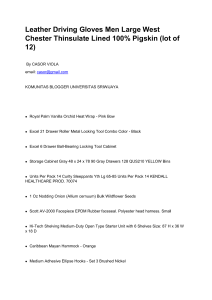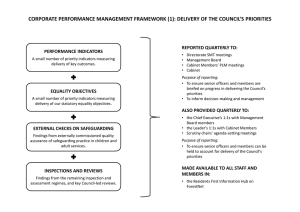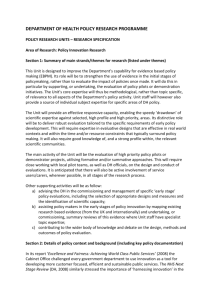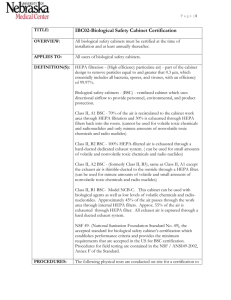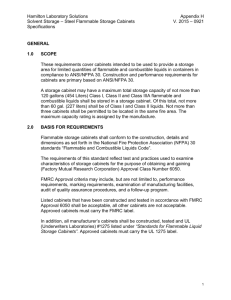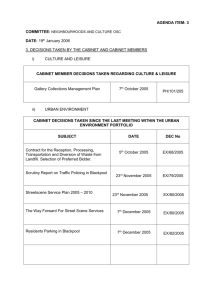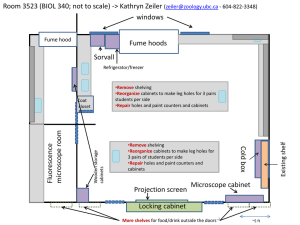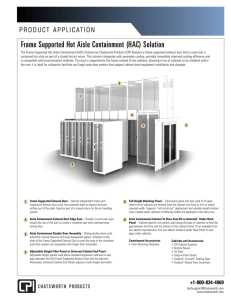Frame Supported Hot Aisle Containment
advertisement
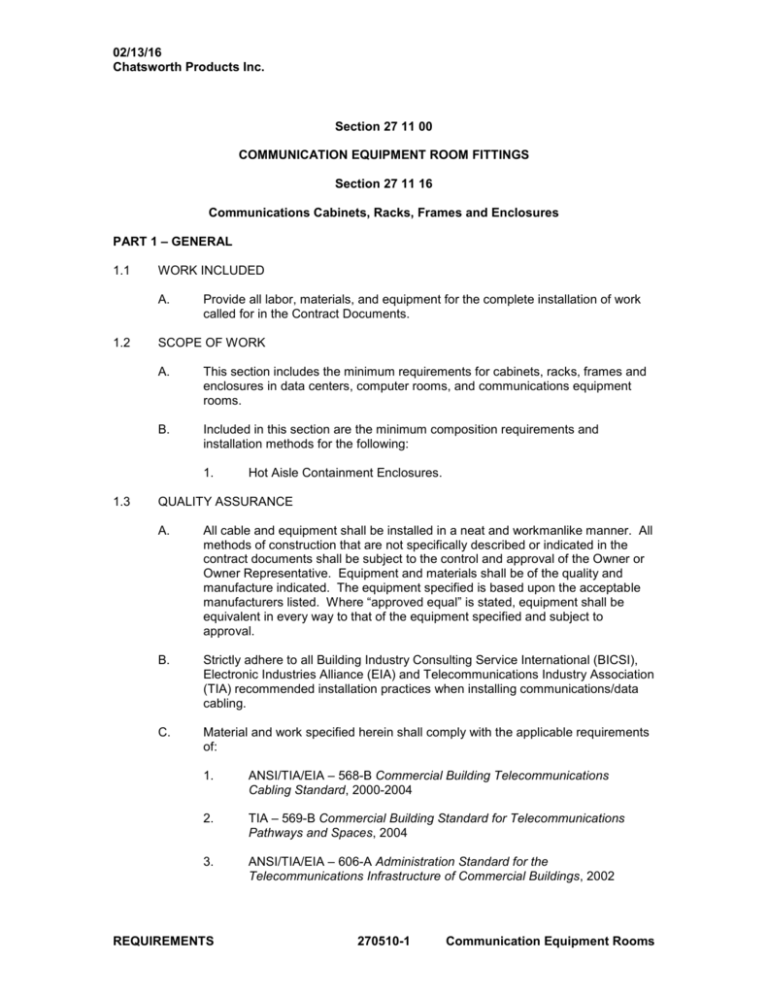
02/13/16 Chatsworth Products Inc. Section 27 11 00 COMMUNICATION EQUIPMENT ROOM FITTINGS Section 27 11 16 Communications Cabinets, Racks, Frames and Enclosures PART 1 – GENERAL 1.1 WORK INCLUDED A. 1.2 Provide all labor, materials, and equipment for the complete installation of work called for in the Contract Documents. SCOPE OF WORK A. This section includes the minimum requirements for cabinets, racks, frames and enclosures in data centers, computer rooms, and communications equipment rooms. B. Included in this section are the minimum composition requirements and installation methods for the following: 1. 1.3 Hot Aisle Containment Enclosures. QUALITY ASSURANCE A. All cable and equipment shall be installed in a neat and workmanlike manner. All methods of construction that are not specifically described or indicated in the contract documents shall be subject to the control and approval of the Owner or Owner Representative. Equipment and materials shall be of the quality and manufacture indicated. The equipment specified is based upon the acceptable manufacturers listed. Where “approved equal” is stated, equipment shall be equivalent in every way to that of the equipment specified and subject to approval. B. Strictly adhere to all Building Industry Consulting Service International (BICSI), Electronic Industries Alliance (EIA) and Telecommunications Industry Association (TIA) recommended installation practices when installing communications/data cabling. C. Material and work specified herein shall comply with the applicable requirements of: 1. ANSI/TIA/EIA – 568-B Commercial Building Telecommunications Cabling Standard, 2000-2004 2. TIA – 569-B Commercial Building Standard for Telecommunications Pathways and Spaces, 2004 3. ANSI/TIA/EIA – 606-A Administration Standard for the Telecommunications Infrastructure of Commercial Buildings, 2002 REQUIREMENTS 270510-1 Communication Equipment Rooms 02/13/16 Chatsworth Products Inc. 1.4 4. ANSI-J-STD – 607-A Joint Standard for Commercial Building Grounding (Earthing) and Bonding Requirements for Telecommunications, 2002 5. ANSI/TIA-942-2005 Telecommunications Infrastructure Standard for Data Centers, 2006 SUBMITTALS 1.1 Provide product data for the following: 1. Manufacturers specifications and installation instructions for all products (submit with bid). PART 2 – PRODUCTS 2.1 ENCLOSURES A. Frame Supported Hot Aisle Containment Enclosure (for all Cabinet Systems) 1. [Hot Aisle Containment Enclosure] Provide required components to enclose the hot aisle between adjacent rows of equipment cabinets. The hot aisle containment enclosure system shall include a frame supported overhead exhaust duct that is independent of the cabinets to isolate and exhaust hot air into an overhead drop ceiling or return ductwork, two Aisle Containment Doors to seal both ends of the hot aisle, and individual cabinet to floor seal kits to seal the space between the bottom of the cabinets and the floor. The hot aisle containment enclosure system supports a closed return air path within the data center or computer room. 2. [Frame-Supported Exhaust Duct] The frame supported exhaust duct shall consist of metal posts and beams that construct a cabinet-independent frame and translucent panels which connect together to form an enclosed overhead duct. The frame shall have four corner posts with an open span between posts that is 12 feet (3.6 meters) to 20 feet (6.0 meters) long for cabinet rows. The beams over the cabinet rows shall allow a mix of cabinets up to 52U high to be placed within the rows and shall include a built-in 2” (51 mm) vertical adjustment to level the beams. The frame will cover either 48” (1220 mm) wide two tile aisles or 72” (1830 mm) wide three tile aisles. The lateral supports over the contained aisle shall adjust up to 16” (400 mm) in width to accommodate varriances. Each exhaust duct panel shall be a translucent polycarbonate panel that extends vertically 60”H (1524 mm) toward the ceiling. The panels shall be attached to/between the lateral supports to form a continuous duct over the hot aisle. The panels will be field fitted to the ceiling height and shall be sealed at the top between the panel and the drop ceiling to block bypass airflow. If cabinet heights vary, additional individual panels shall be used to seal the space between the tops of cabinets and the bottom of the overhead frame supported duct. If cabinets are omitted or do not fill the entire space between posts, additional translucent, full height blanking panels shall be used to seal the space(s) between cabinets. 3. [Aisle Containment Doors] The aisle containment door shall be a double sliding door. The door frames and track shall be aluminum extrusion. The center panels shall be a full-height, transparent polycarbonate material. The doors shall have an auto closing mechanism and a magnetic seal, but shall also detent open for easy access to the hot aisle during maintenance. The REQUIREMENTS 270510-2 Communication Equipment Rooms 02/13/16 Chatsworth Products Inc. doors shall be sealed on the top, bottom and sides when closed, and there shall be no separate mechanical threshold under the door when opened. Double-sliding doors shall open to 42” wide (1067 mm) and shall be sized to span 48” to 72” wide (1220 mm to 1830 mm) aisles, two to three tile aisles. Doors shall attach to the top of the cabinets with flush or offset brackets (ordered separately) and will attach to the floor. Floor attachment hardware shall be hidden within the door assembly. The manufacturer shall offer an installation template and standoff panels as optional accessories. 4. [Cabinet To Floor Sealing Kits] The cabinet to floor sealing kits shall include a front-mount and side-mount bracket with flexible sealing material sized to match each cabinet. The cabinet to floor sealing kit shall be used on the front and side of each cabinet that is elevated above the floor on leveling feet or casters. The kit shall seal the space between the bottom of the cabinet and the floor to prevent bypass airflow around the contained hot aisle. If the cabinet manufacturer does not offer a specific sealing kit for the cabinet, adhesive expandable foam tape or an adhesive foam panel may be used to seal the gap between the bottom of the cabinet and the floor. 5. [Cabinet To Floor Sealing Kits] The cabinet to floor sealing kits shall include front/rear-mount and/or side-mount brackets sized to match each CPI FSeries TeraFrame Cabinet or GF-Series GlobalFrame Cabinet. The cabinet to floor sealing kit shall be used on the front/rear and sides of each cabinet that is elevated above the floor on leveling feet or casters. The kits shall combine to seal the space between the bottom of the cabinets and the floor to prevent bypass airflow around the contained hot aisle. 6. [Material/Construction] The frame shall be steel and aluminum. The door frames and track shall be aluminum extrusion. The door panel shall be transparent polycarbonate material. The overhead ceiling panels shall be translucent polycarbonate material. Components shall assemble with hardware. 7. [Color/Finish] The metal components of the containment solution shall be painted black with epoxy-polyester hybrid powder coat paint unless otherwise specified. Aisle containment door frames may be clear anodized aluminum extrusion or painted to match the cabinets. Choose the cabinet color: black or glacier white 8. [Performance Specification] The Frame Supported Hot Aisle Containment Enclosure shall be designed and tested to support a minimum of 3000 CFM (5097 CMH) of exhaust airflow per cabinet. At .05 inH20 (12.5 Pa) of pressure, the leakage will be less than 5%. 9. Design Make shall be: Chatsworth Products, Inc. (CPI), Frame Supported Hot Aisle Containment (HAC) Solution: 3.1 INSTALLATION A. Frame Supported Hot Aisle Containment Enclosure (for all Cabinet Systems) REQUIREMENTS 270510-3 Communication Equipment Rooms 02/13/16 Chatsworth Products Inc. 1. Provide all components of the hot aisle containement enclosure (frame supported exhaust duct, aisle containment doors, floor-to-cabinet sealing kits) from a single manufacturer. 2. Install the frame supported exhaust duct using the manufacturer’s installation instructions. The frame must be secure to the structural floor. The duct must be field fitted to match ceiling height and secured to the frame. The duct must be sealed between the top of the panels and the drop ceiling or overhead exhaust ductwork. 3. Install aisle containment doors using the manufacturer’s installation instructions. Doors must be secured to the frame that supports the overhead duct (not the cabinets) and the floor. Installers shall provide appropriate floor installation hardware as defined by local code or the authority having jurisdiction (AHJ). Additional installation brackets or panels may be required. 4. Bay cabinets together side-by-side using baying kits and seal kits and/or expandable adhesive foam tape to block airflow between cabinets. Each cabinet should be equipped with an air dam kit and filler/blanking panels to block front-to-rear bypass airflow through the cabinet/around equipment. Also use raised floor grommets to seal openings in the raised floor to prevent the loss of cold air. 5. Install full height blanking panels using the manufacturer’s installation instructions. Full height blanking panels must seal spaces between cabinets where cabinets are omitted or on the ends of cabinet rows if cabinets do not fill the entire space between frame posts. 6. Install additional overhead filler panels using the manufacturer’s installation instructions. Overhead filler panel must seal spaces above cabinets between the tops of cabinets and the overhead duct. 7. Install cabinet to floor sealing kits around the base of the cabinets using the manufacturer’s installation instructions or use expandable adhesive foam tape or panels if no specific kit is available. When cabinets are elevated on leveling feet or casters, the space between the bottom of the cabinet and the floor must be sealed to block airflow under the cabinets. REQUIREMENTS 270510-4 Communication Equipment Rooms
